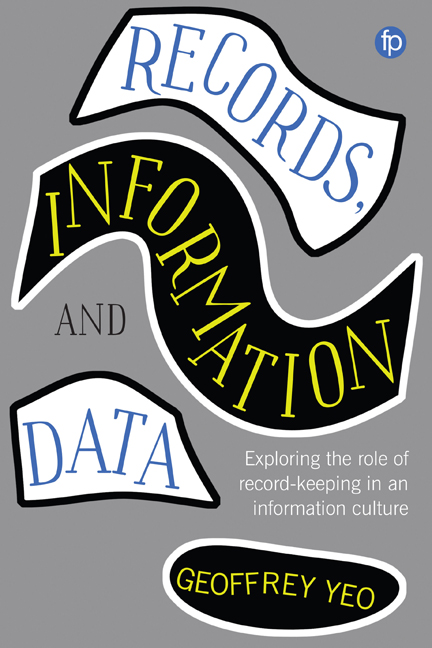Book contents
- Frontmatter
- Contents
- Introduction
- 1 The Making and Keeping of Records: a Brief Historical Overview
- 2 Thinking About Records and Archives; the Transition to the Digital
- 3 Archivists, Records Managers and the Rise of Information
- 4 Finding a Way Through the Hall of Mirrors: Concepts of Information
- 5 Records and Data
- 6 Representation, Performativity and Social Action: Why Records Are Not (Just) Information
- 7 Managing Information or Managing Records?
- Concluding Thoughts: Record-Keeping Present and Future
- Index
6 - Representation, Performativity and Social Action: Why Records Are Not (Just) Information
Published online by Cambridge University Press: 24 September 2019
- Frontmatter
- Contents
- Introduction
- 1 The Making and Keeping of Records: a Brief Historical Overview
- 2 Thinking About Records and Archives; the Transition to the Digital
- 3 Archivists, Records Managers and the Rise of Information
- 4 Finding a Way Through the Hall of Mirrors: Concepts of Information
- 5 Records and Data
- 6 Representation, Performativity and Social Action: Why Records Are Not (Just) Information
- 7 Managing Information or Managing Records?
- Concluding Thoughts: Record-Keeping Present and Future
- Index
Summary
Introduction
Despite the numerous voices proclaiming the value and importance of information and data in the contemporary world, it is far from clear that ideas about information and data can provide an adequate basis for comprehending how records work. This chapter sets out an alternative approach and suggests that records professionals may find it more rewarding to understand records as representations. It offers a brief introduction to concepts of representation and explores some of the ways in which representations are deployed in human interaction. It also examines how viewing records as representations can provide a starting-point for investigating their relationships to activities and events, their performative aspects and their varied roles in society. Instead of seeing records as primarily informational, this chapter argues that record-making is always intimately bound to contexts of social action.
Representations
Although concepts of representation have not traditionally played a major part in professional understandings of records, they have been widely discussed in many other disciplines, including art, film and media studies, linguistics, philosophy and psychology. A represent - ation is something that stands, or is believed to stand, for something else. Examples of representations include charts, diagrams, models, statues, pictures, gestures, dramatic performances and musical notations. Language and writing are also often said to be forms of representation.
Commentators have frequently noted that no representation can capture every aspect of the phenomenon it seeks to represent. Representations are always partial.1 Nevertheless, we encounter them everywhere. Some are primarily aesthetic, but many have practical functions as surrogates for things that would otherwise be absent or inaccessible (Ankersmit, 2001; Cummins, 1996). Representations – and ideas about representation – can help us to comprehend the material and social world in which we live and to make sense of many aspects of human behaviour and experience.
We may find that viewing records as representations is more productive than attempting to view them in informational terms. More specifically, we can see records as representations of occurrents. Occurrents are phenomena that have, or are perceived to have, an ending in time. A record stands for an occurrent and remains available after the occurrent has ceased (Yeo, 2007; 2008).
- Type
- Chapter
- Information
- Records, Information and DataExploring the Role of Record Keeping in an Information Culture, pp. 129 - 162Publisher: FacetPrint publication year: 2018



